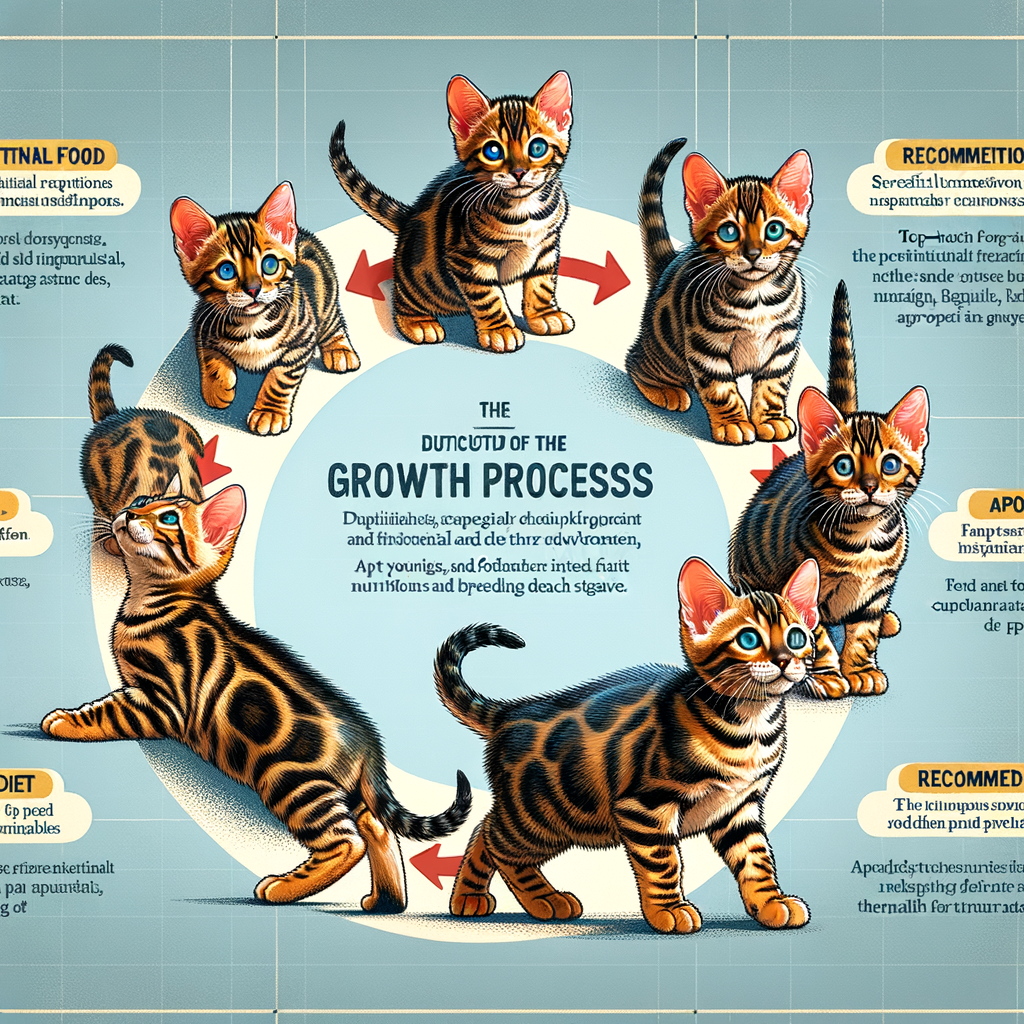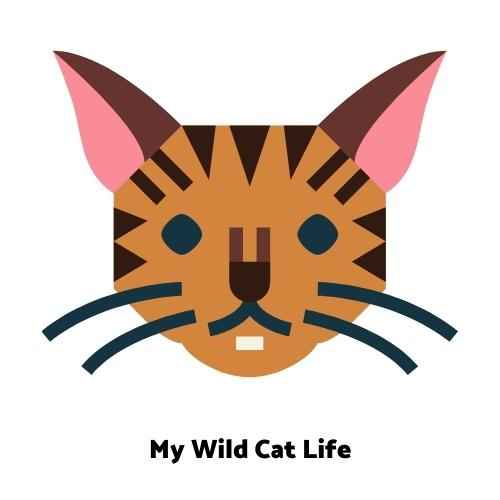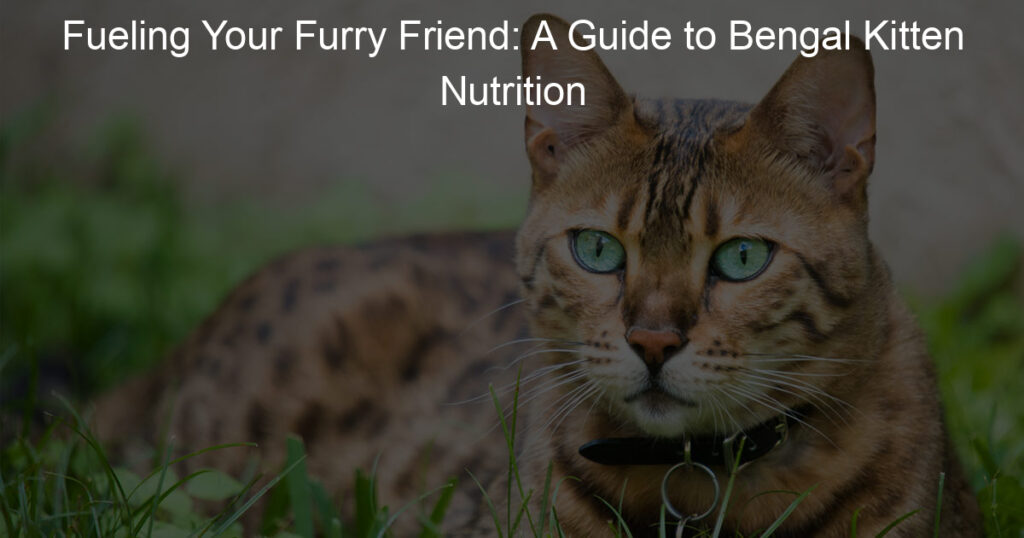
Introduction to Bengal Kitten Nutrition
Understanding the nutritional needs of your Bengal kitten is crucial to their health and well-being. This introduction will provide you with a basic understanding of what your Bengal kitten needs to grow and thrive.
A balanced diet is essential for your Bengal kitten’s growth and development. Just like humans, kittens need a variety of nutrients to stay healthy. These include proteins, fats, vitamins, and minerals. A balanced diet ensures that your kitten gets all these nutrients in the right proportions.
Protein is particularly important for Bengal kittens. It helps them grow strong muscles and provides energy. Fats are also crucial as they support brain development, keep the skin and fur healthy, and also provide energy. Vitamins and minerals, on the other hand, are needed for various body functions and to strengthen the immune system.
Feeding your Bengal kitten a balanced diet from a young age can help prevent health issues in the future, such as obesity, heart disease, and diabetes. It can also contribute to a longer, healthier life.
Bengal cats, like all cats, are obligate carnivores. This means they need a diet high in animal protein. In the wild, they would get this from hunting. In a domestic setting, you need to ensure their food provides this.
Here is a basic overview of the nutritional needs of Bengal cats:
| Nutrient | Why It’s Important |
|---|---|
| Protein | For energy and muscle growth |
| Fats | For brain development and skin health |
| Vitamins | For various body functions and immune system |
| Minerals | For bone health and various body functions |
Remember, each Bengal cat is unique and may have different nutritional needs. It’s always best to consult with a vet to determine the best diet for your Bengal cat.
Bengal Kitten Diet: What You Need to Know
Understanding the dietary needs of your Bengal kitten is crucial for their growth and overall health. Bengal kittens, like all kittens, have specific nutritional requirements that differ from those of adult cats. Let’s delve into the details of what your Bengal kitten needs to thrive.
Understanding Bengal Kitten Food Requirements
When it comes to feeding your Bengal kitten, two key components should be considered: protein and fat, along with vitamins and minerals. These elements are essential for your kitten’s growth, energy, and health.
-
- Protein and Fat Requirements
Protein is a vital part of a Bengal kitten’s diet. It helps build muscles and provides energy. Kittens need about 30% of their diet to be protein. Fat is also essential as it provides a concentrated source of energy. Around 20% of a kitten’s diet should be fat.
-
- Vitamin and Mineral Needs
Vitamins and minerals play a significant role in a kitten’s diet. They support various bodily functions, including bone growth, vision, and immune system function. For instance, calcium and phosphorus are necessary for strong bones and teeth, while vitamin A is crucial for vision and immune health. It’s important to note that kittens need a balanced diet, so providing a variety of foods can help ensure they get all the vitamins and minerals they need.
In conclusion, understanding your Bengal kitten’s dietary needs is the first step in ensuring they grow into a healthy and happy cat. Remember, a balanced diet rich in protein, fat, vitamins, and minerals is key to your kitten’s health and well-being.
Best Food for Bengal Kittens
When it comes to feeding your Bengal kitten, there are two main options to consider: commercial kitten food and a homemade diet. Each has its own benefits and considerations, which we will explore in detail below.
-
- Commercial Kitten Food Options
Commercial kitten food is a convenient and balanced option for feeding your Bengal kitten. These foods are specially formulated to meet the nutritional needs of growing kittens, including high protein and fat content, as well as essential vitamins and minerals.
There are many brands available, offering both dry and wet food options. It’s important to choose a high-quality brand that uses real meat as the primary ingredient. Avoid foods with fillers like corn, wheat, and soy, as these can lead to digestive issues.
Remember, while commercial kitten food is convenient, it’s essential to read the labels carefully to ensure you’re providing the best nutrition for your Bengal kitten.
-
- Homemade Diet Considerations
Some Bengal kitten owners prefer to prepare a homemade diet. This allows for complete control over the ingredients and can be a good option if your kitten has specific dietary needs or allergies.
A homemade diet for a Bengal kitten should be high in protein, with a good balance of fats and carbohydrates. It should also include necessary vitamins and minerals. You can achieve this by using a variety of meats, vegetables, and supplements.
However, creating a balanced homemade diet can be complex and time-consuming. It’s crucial to consult with a veterinarian or a pet nutrition expert to ensure your kitten is getting all the necessary nutrients.
In conclusion, whether you choose commercial kitten food or a homemade diet, the most important thing is to ensure your Bengal kitten is getting a balanced and nutritious diet. This will set the foundation for a healthy and happy life.
Growing Bengal Kitten Care: Feeding and Nutrition
Proper feeding and nutrition are essential for your growing Bengal kitten’s health and development. Let’s delve into the specifics of how to feed your Bengal kitten and transition them from milk to solid food.
Bengal Kitten Feeding Guide
Feeding your Bengal kitten involves understanding the right frequency and portion sizes, and knowing when and how to transition them from milk to solid food. Here are some key points to remember:
-
- Feeding frequency and portion sizes
Bengal kittens require frequent feeding to support their rapid growth. From birth to 4 weeks, kittens should be fed every 2-3 hours. As they grow older, the frequency decreases. By the time they are 3 months old, they should be fed 3-4 times a day. The portion size should be small and gradually increased as they grow.
-
- Transitioning from milk to solid food
Transitioning your Bengal kitten from milk to solid food is a crucial step. This process usually begins when the kitten is around 4 weeks old. Start by introducing a mixture of kitten formula and high-quality wet kitten food. Gradually decrease the amount of formula and increase the solid food over a period of 2-3 weeks until they are eating only solid food.
Remember, every kitten is unique and may have different dietary needs. Always consult with your vet for personalized advice. Proper feeding and nutrition in the early stages of your Bengal kitten’s life can set the foundation for a healthy and happy adulthood.
Kitten Growth Nutrition: Key Stages
Understanding the nutritional needs of your Bengal kitten at different stages of growth is crucial for their health and development. Let’s delve into the key stages of kitten growth and the corresponding nutritional requirements.
- Newborn to 4 weeksDuring this stage, kittens are entirely dependent on their mother’s milk, which is rich in colostrum that boosts their immunity. If the mother cat isn’t available, a kitten milk replacement formula can be used. It’s important to avoid cow’s milk as it can cause digestive issues.
- 4 weeks to 12 weeksAt this stage, kittens start transitioning to solid food. Start with a high-quality, protein-rich kitten food that’s easy to chew. It’s recommended to feed them four small meals a day. Remember to keep fresh water available at all times.
- 3 months to 6 monthsAs your kitten grows, their nutritional needs increase. Continue feeding them high-quality kitten food, but increase the portion sizes gradually. It’s also the time to introduce a feeding schedule, typically three meals a day.
- 6 months to 1 yearDuring this stage, your kitten is almost an adult. You can gradually transition them to adult cat food. Make sure the food is balanced and complete, with all the necessary nutrients. Two meals a day is usually sufficient for cats of this age.
Remember, every kitten is unique and may have different dietary needs. Always consult with your vet to ensure your kitten is getting the right nutrition for their age and growth stage.
Bengal Kitten Health: The Role of Nutrition
The health of a Bengal kitten is largely influenced by its nutrition. A well-balanced diet can help prevent common health issues and promote overall wellness. In this section, we will explore some common health problems Bengal kittens may face and how proper nutrition can help address these issues.
Common Health Issues and Nutritional Solutions
Bengal kittens, like other breeds, can suffer from a variety of health issues. However, many of these can be managed or even prevented with the right diet. Here are a couple of common health problems and the nutritional solutions that can help:
-
- Obesity and dietary management
Obesity is a common issue in Bengal kittens, often due to overfeeding or lack of exercise. A diet high in protein and low in carbohydrates can help manage your kitten’s weight. It’s also important to monitor portion sizes and ensure your kitten gets plenty of physical activity.
-
- Urinary problems and hydration needs
Urinary problems can also be a concern for Bengal kittens. These can be caused by a lack of hydration or a diet that is too high in certain minerals. To prevent this, ensure your kitten has constant access to fresh water and consider a diet that promotes urinary health.
Remember, every kitten is unique and may have different nutritional needs. Always consult with a vet to determine the best diet for your Bengal kitten’s specific needs.
Case Study: Bengal Kitten Health Improvement with Diet Change
Let’s delve into a real-life example that illustrates the significant impact of diet on a Bengal kitten’s health. This case study involves a Bengal kitten named Bella, who experienced a remarkable health transformation after a significant change in her diet.
-
- Background of the case
Bella, a 6-month-old Bengal kitten, was frequently lethargic and had a dull coat, which are signs of poor health. Her owner, concerned about Bella’s condition, consulted a vet. The vet suspected that Bella’s diet might be the root cause of her health issues.
-
- Dietary changes implemented
The vet recommended a diet change for Bella. The new diet plan included high-quality, grain-free kitten food, rich in protein and essential nutrients. It also incorporated wet food to ensure Bella was getting enough hydration. The vet also advised Bella’s owner to provide fresh water at all times and limit treats to maintain a balanced diet.
-
- Results and key takeaways
After a few weeks of implementing the new diet, Bella’s health improved significantly. She became more energetic, and her coat became shiny and soft, indicating good health. This case study underscores the importance of proper nutrition in maintaining the health of a Bengal kitten. It also highlights the need for regular vet check-ups to ensure that your kitten’s diet meets its nutritional needs.
| Initial Condition | Dietary Changes | Results |
|---|---|---|
| Lethargic, dull coat | High-quality, grain-free food, wet food, fresh water, limited treats | Increased energy, shiny coat |
In conclusion, Bella’s case study demonstrates the profound impact of diet on a Bengal kitten’s health. By providing a balanced, nutrient-rich diet, you can ensure your Bengal kitten grows into a healthy and vibrant cat.
Conclusion: The Lifelong Impact of Good Nutrition
As we wrap up our discussion on Bengal kitten nutrition, it’s important to underscore the lifelong impact of good nutrition on these adorable felines. A balanced diet is not just about keeping your kitten happy and active today, but also about ensuring their health and vitality for years to come.
- Long-term benefits of a balanced diet for Bengal kittens
Feeding your Bengal kitten a balanced diet from a young age can have a multitude of long-term benefits. For starters, it can help maintain a healthy weight, reducing the risk of obesity-related health issues. A balanced diet also supports a strong immune system, helping your kitten fight off diseases and infections.
Moreover, good nutrition can contribute to a shiny and healthy coat, a clear sign of overall health. It can also promote good dental health, reducing the risk of dental diseases. Lastly, a balanced diet can support healthy growth and development, ensuring your kitten grows into a strong and healthy cat.
- Final thoughts on Bengal kitten nutrition
In conclusion, Bengal kitten nutrition is not a topic to be taken lightly. The food you provide for your kitten in their early stages of life can significantly impact their health and well-being in the long run. Therefore, it’s crucial to invest time and effort in understanding and providing the right nutrition for your Bengal kitten.
Remember, a balanced diet for your Bengal kitten should include the right mix of proteins, fats, carbohydrates, vitamins, and minerals. It’s not about feeding them the most expensive food, but rather the most nutritious one. Your kitten’s health and happiness are worth every effort.
| Key Elements of a Balanced Diet | Benefits |
|---|---|
| Proteins | Supports growth and development |
| Fats | Provides energy and supports brain function |
| Carbohydrates | Provides energy and aids digestion |
| Vitamins and Minerals | Supports immune system and overall health |














